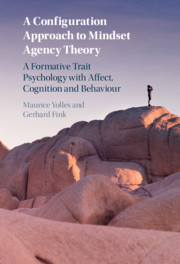 A Configuration Approach to Mindset Agency Theory
A Configuration Approach to Mindset Agency Theory from Part I - Cybernetic Sociopsychology and Agency
Published online by Cambridge University Press: 28 July 2021
Theory tells us that, knowing the stable type orientation of an agency associated with patterns of behaviour, it is possible to predict agency behaviour under normal conditions. Such normality is defined in terms of homeostatic equilibrium where any environmental perturbations that an agency experiences can be dealt with through existent control processes to stimulate appropriate responses. However, in post-normal (Ravetz, 1999; Yolles, 2010) conditions where homeostatic equilibrium becomes disengaged, the innate stability of the agency type orientation is lost and the likelihood of successful prediction is reduced. Within this context, in this chapter the conceptual work from the last chapter will be built on. Our particular trait model that indicate the nature of the controlling traits will be introduced in due course. These traits are variables that take type values that determine agency orientation, and normally (under stable conditions) it is these that determine its patterns of behaviour and provide opportunities to predict instance of behaviour.
To save this book to your Kindle, first ensure [email protected] is added to your Approved Personal Document E-mail List under your Personal Document Settings on the Manage Your Content and Devices page of your Amazon account. Then enter the ‘name’ part of your Kindle email address below. Find out more about saving to your Kindle.
Note you can select to save to either the @free.kindle.com or @kindle.com variations. ‘@free.kindle.com’ emails are free but can only be saved to your device when it is connected to wi-fi. ‘@kindle.com’ emails can be delivered even when you are not connected to wi-fi, but note that service fees apply.
Find out more about the Kindle Personal Document Service.
To save content items to your account, please confirm that you agree to abide by our usage policies. If this is the first time you use this feature, you will be asked to authorise Cambridge Core to connect with your account. Find out more about saving content to Dropbox.
To save content items to your account, please confirm that you agree to abide by our usage policies. If this is the first time you use this feature, you will be asked to authorise Cambridge Core to connect with your account. Find out more about saving content to Google Drive.